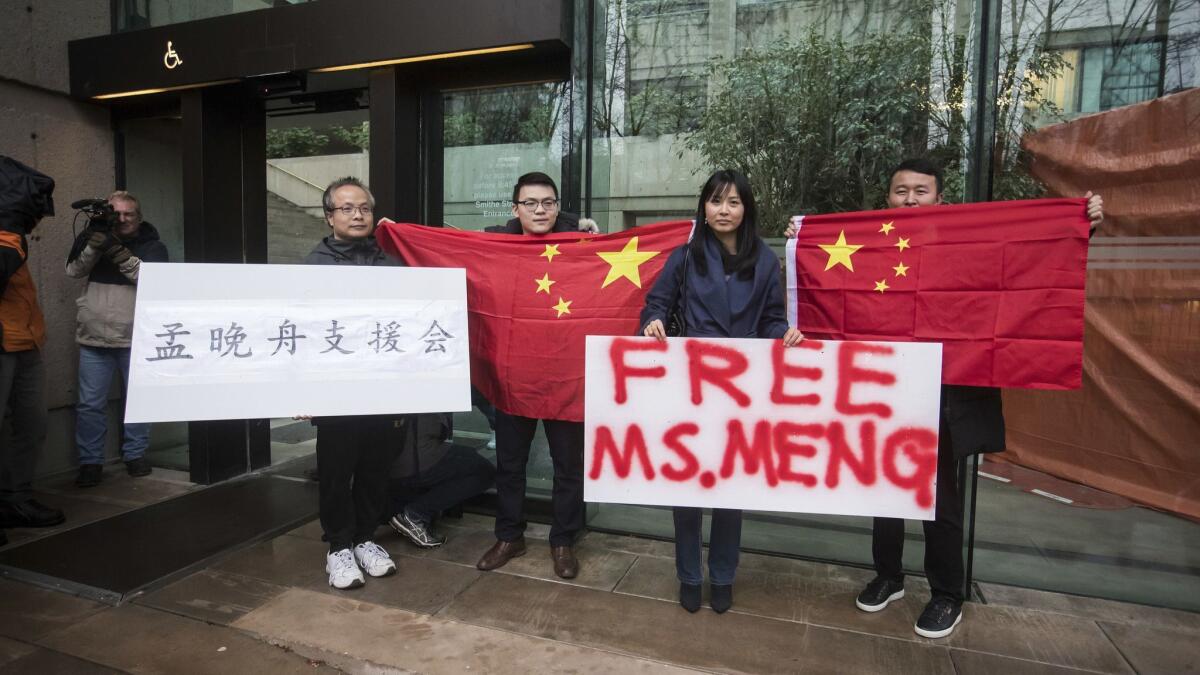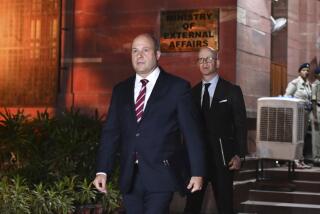Tit for tat? China detains former Canadian diplomat as Canada releases Huawei executive on bail

Reporting from Beijing — China has detained a former Canadian diplomat, exerting intense pressure on relations between the two countries, but the arrest is not expected to alter the outcome of an extradition hearing in Vancouver for a top Chinese tech conglomerate executive.
Canadian officials confirmed news of Michael Kovrig’s arrest, which occurred sometime before Chinese executive Meng Wanzhou was released on bail Tuesday by the Supreme Court of British Columbia. She faces the possibility of extradition to the United States on fraud charges related to the breaching of U.S. sanctions on Iran. It was unclear precisely when Kovrig was taken into custody.
Since Meng’s arrest, China has called the case a violation of her rights and demanded that leaders of both Canada and the United States intervene to free her. It has called in ambassadors from both countries to protest.
Although Canada is legally bound to extradite her should a court uphold the case, China has focused harsher pressure on Canada than on the United States in recent days.
It threatened “severe consequences” for Canada if Meng was not freed.
“The government will not sit back in silence amid bullying that recklessly violates the legitimate rights and interests of Chinese citizens. The Chinese government will defend its citizens’ legal rights by all means,” Chinese Foreign Minister Wang Yi said Tuesday, in an apparent reference to Meng.
There is no confirmation that Kovrig’s arrest, announced in a statement on the website of his employer, the International Crisis Group, is a tit-for-tat action designed to force Canada to free Meng.
But Roland Paris, a former policy advisor to Canadian Prime Minister Justin Trudeau, said China should know that such pressure will not work.
“Retaliation against Canadian interests or Canadians would be unacceptable and pointless. It would have zero impact on judicial proceedings in Canada. Beijing should already know this from previous experience,” he commented on Twitter. “Let cooler heads prevail.”
Trudeau said Canada was in contact with Chinese officials over the Kovrig case.
“We have been in direct contact with the Chinese diplomats and representatives. We are engaged in a file which we take very seriously and we are of course providing consular assistance to the family,” he said.
The arrest raises fears that China may target a U.S. business or American figure in retaliation should Meng face trial in New York. Canada had canceled a trade mission to China amid fears officials could be targeted because of the Meng case.
However, Chinese officials have signaled they do not want Meng’s arrest to cast a pall on important trade talks designed to end the U.S.-China trade war, leading up to a March 1 deadline. If there is no comprehensive deal by then, steep tariff hikes will take effect and it could take months or years to resolve the crisis.
One reason for China’s tougher approach to Canada may be Beijing’s desire to reach a deal on trade with the Trump administration, amid signs the impasse is hurting both the U.S. and Chinese economies and may impede global growth, amid warnings of a global downturn.
A former Canadian ambassador to China, David Mulroney, told Canadian television this week that by exerting tougher pressure on his country, China seemed to be employing a tactic of “kill the chicken, scare the monkeys” — picking on Canada, a smaller nation, to make a point with a bigger one, the United States.
Kovrig is based in Hong Kong but travels often to mainland China, investigating issues related to global security for the International Crisis Group, a Brussels-based independent nonprofit specializing in analysis of conflicts and crises around the globe. His role is to report on foreign affairs and global security issues in China, Japan and the Korean peninsula.
He was formerly a Canadian diplomat posted in Beijing, Hong Kong and the United Nations. Canada’s Globe and Mail newspaper reported that Kovrig is on unpaid leave and still technically an employee of the Canadian government.
Canadian Public Safety Minister Ralph Goodale said Canada was deeply concerned and working to establish why Kovrig had been detained. He said there was no explicit indication that the cases were related.
Guy Saint-Jacques, a former Canadian ambassador to China, said he had no doubt Kovrig was detained in retaliation for Meng’s arrest, the Associated Press reported.
“In China there is no coincidence,” he said. “Unfortunately Canada is caught in the middle of this dispute between the U.S and China. Because China cannot kick the U.S. they turn to the next target.”
Canadian politician Bob Rae said on Twitter the reasons for Kovrig’s arrest were clear: “Of course it’s clear. It’s called repression and retaliation.”
The case bears a sharp resemblance to one in 2014, in which two Canadians were arrested amid extradition proceedings for a Chinese national from Canada to the United States.
Su Bin, a Chinese businessman living in Canada, was arrested in July 2014, accused of hacking the computers of American defense contractors. He was extradited to the U.S., where he pleaded guilty to stealing military secrets and was sentenced by a Los Angeles court to four years in prison.
Kevin and Julia Garratt, a Canadian couple running a coffee shop in Dandong, China, near the North Korean border, were arrested in August 2014.
Julia Garratt was detained for six months before being granted bail and allowed to leave the country. Kevin Garratt was jailed for two years before he was convicted of spying and deported.
Before their arrests, the Garratts had spent 30 years living in China and raising a family, after arriving to teach English. They believed they became pawns in an international power play.
In a book about the case, Julia Garratt said Chinese police yelled that she was a spy, before dragging her to a car and driving her away. Her husband was taken away in a separate car.
Although U.S. officials insist that Meng’s case has nothing to do with the current trade frictions between Washington and Beijing or the trade talks that are unfolding, Chinese state media have likened her arrest to kidnapping and “hostage taking.”
The editor of China’s state-owned Global Times, Hu Xijin, said Meng’s arrest was “bringing terrorism to state and business competition” and “piling pressure on a company and the country behind it.” He called it “much worse than an ordinary human rights violation.”
Hu wrote in Weibo, China’s equivalent of Twitter, on Tuesday that there was no evidence that Kovrig’s detention was related to the arrest of Meng. But he said people would make the association because Meng’s arrest was “way over the line.”
“If people in the rest of the world make this association, it’s because Meng Wanzhou’s arrest was really way over the line. Naturally, people would think that China would take revenge,” Hu wrote.
UPDATES:
6:35 p.m.: This article has been updated throughout with staff reporting.
This article was originally posted at 4:40 p.m.
More to Read
Sign up for Essential California
The most important California stories and recommendations in your inbox every morning.
You may occasionally receive promotional content from the Los Angeles Times.










